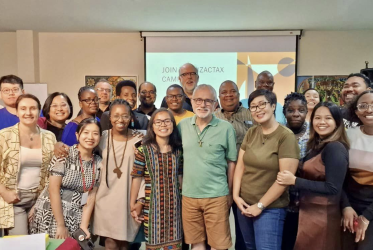Displaying 1 - 20 of 49
09 February 2024
GEM School explores how to make new economic world order a reality
08 September 2023
Webinar brings Pacific voices for a new creation
10 February 2021
Applications open for WCC Eco-School
22 October 2020
Eco-School promotes blue communities, green churches
19 November 2019
WCC Eco-School begins in Thailand
07 November 2019
In Fiji, young people ‘walk the talk’ with advocacy
12 September 2019
“Economy of life” lifted up at special school in Indonesia
22 August 2019
WCC condemns massacre of farmers in Philippines
12 April 2019
El CMI condena el asesinato de campesinos en Filipinas
12 April 2019










